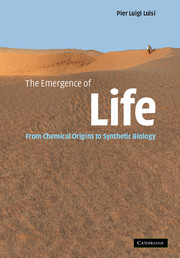Book contents
- Frontmatter
- Contents
- Preface
- Acknowledgments
- List of books on the origin of life
- 1 Conceptual framework of research on the origin of life on Earth
- 2 Approaches to the definitions of life
- 3 Selection in prebiotic chemistry: why this … and not that?
- 4 The bottle neck: macromolecular sequences
- 5 Self-organization
- 6 The notion of emergence
- 7 Self-replication and self-reproduction
- 8 Autopoiesis: the logic of cellular life
- 9 Compartments
- 10 Reactivity and transformation of vesicles
- 11 Approaches to the minimal cell
- Outlook
- References
- Index
6 - The notion of emergence
Published online by Cambridge University Press: 17 December 2010
- Frontmatter
- Contents
- Preface
- Acknowledgments
- List of books on the origin of life
- 1 Conceptual framework of research on the origin of life on Earth
- 2 Approaches to the definitions of life
- 3 Selection in prebiotic chemistry: why this … and not that?
- 4 The bottle neck: macromolecular sequences
- 5 Self-organization
- 6 The notion of emergence
- 7 Self-replication and self-reproduction
- 8 Autopoiesis: the logic of cellular life
- 9 Compartments
- 10 Reactivity and transformation of vesicles
- 11 Approaches to the minimal cell
- Outlook
- References
- Index
Summary
Introduction
In the previous pages we have discussed how the increase of molecular complexity may proceed via self-organization, emphasizing, however, that a simple increase of size and/or complexity is not enough – this must be accompanied by the onset of novel properties – up to the point where self-reproduction and eventually life itself arise. In fact, self-organization must be considered in conjunction with corresponding emergent properties.
The term “emergence” describes the onset of novel properties that arise when a higher level of complexity is formed from components of lower complexity, where these properties are not present. This is often summarized in the popular assertion that the “whole is more than the sum of the parts”, and/or with the vague term “holism”.
For a long time, emergence has been an active field of inquiry in the philosophy of science. As noted by McLaughlin (1992), the work of “British emergentism” can be dated back to Mill (1872) and Bain (1870) and flourished in the 1920s with the work of Alexander (1920), Morgan (1923), and Broad (1925); and the inquiry continues up to the present (see, Wimsatt, 1972; 1976a, b), Kim, 1984; Klee, 1984; Sperry, 1986; O'Connor, 1994; Bedau, 1997; Farre and Oksala, 1998; Holland, 1998; Primas, 1998; Schroeder, 1998, and several others).
The possible relevance of chemistry in the notion of emergence was realized as early as the mid-nineteenth century (Mill, 1872); and in 1923, as quoted by McLaughlin (1992), Broad stated that:
the situation with which we are faced in chemistry (…) seems to offer the most plausible example of emergent behavior.
- Type
- Chapter
- Information
- The Emergence of LifeFrom Chemical Origins to Synthetic Biology, pp. 112 - 128Publisher: Cambridge University PressPrint publication year: 2006
- 1
- Cited by

